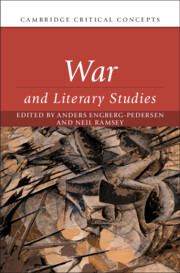Book contents
- War and Literary Studies
- Cambridge Critical Concepts
- War and Literary Studies
- Copyright page
- Contents
- Figures
- Contributors
- Acknowledgments
- Introduction: War, Literature, and the History of Knowledge
- Part I Origins and Theories
- Chapter 1 War and Ancient Athens
- Chapter 2 War and Chinese Culture
- Chapter 3 War and Romantic Thought
- Chapter 4 War and Critical Theory
- Chapter 5 War and French Theory
- Chapter 6 War and Media Studies
- Chapter 7 War and Postcolonial Studies
- Part II Foundational Concepts
- Part III Emerging Concepts
- Index
Chapter 6 - War and Media Studies
from Part I - Origins and Theories
Published online by Cambridge University Press: 15 January 2023
- War and Literary Studies
- Cambridge Critical Concepts
- War and Literary Studies
- Copyright page
- Contents
- Figures
- Contributors
- Acknowledgments
- Introduction: War, Literature, and the History of Knowledge
- Part I Origins and Theories
- Chapter 1 War and Ancient Athens
- Chapter 2 War and Chinese Culture
- Chapter 3 War and Romantic Thought
- Chapter 4 War and Critical Theory
- Chapter 5 War and French Theory
- Chapter 6 War and Media Studies
- Chapter 7 War and Postcolonial Studies
- Part II Foundational Concepts
- Part III Emerging Concepts
- Index
Summary
Over the last decades both 'war' and 'media' have been unleashed – both conceptually and in practice – in ways that defy conventional understanding of the terms. One obvious reason is digitization, the explosive, closely entangled growth of cyberwar and cyberspace. This make it all the more important to scrutinize the peculiar mutual attraction the study of war and the study of media tend to exert upon each other. For media studies, the study of war, and the progress of weapons technology in particular, allows for the creation of evolutionary models that privilege internal dynamics of technological supersession at the expense of external factors. The focus on new, increasingly autonomous media technologies, in turn, privileges variants of technological solutionism on the side of military experts and historians. In both cases, however, conceptual difficulties arise not only from the unprecedented growth of new infrastructures, but also from the realization that both 'war' and 'media' were never – or only in a fairly limited post-1648 European context – what the terms commanded them to be.
- Type
- Chapter
- Information
- War and Literary Studies , pp. 102 - 118Publisher: Cambridge University PressPrint publication year: 2023

